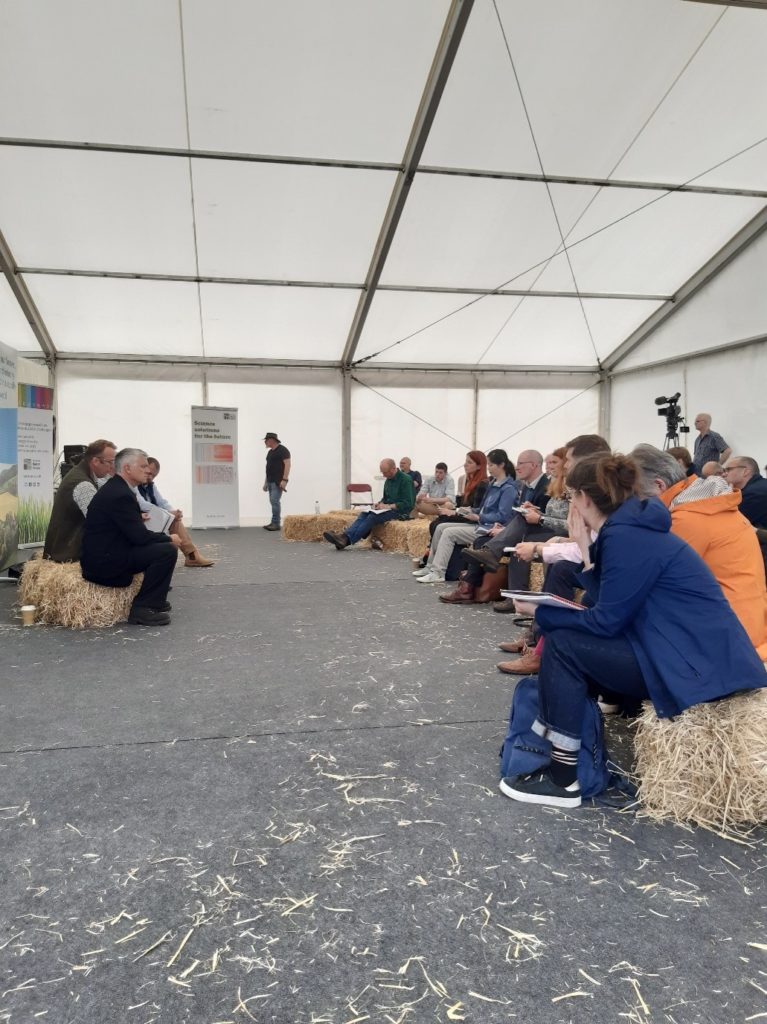Arable Scotland Attendees Debate Global Challenges
31 July 2022With crops rapidly ripening off and harvest accelerating towards growers it might have been natural for attendees at the Arable Scotland event on the 5th July to focus on local and domestic issues, but the debates hosted at the event quickly got to the big global challenges around markets, climate and sustainability drivers.
The Arable Scotland event hosted four arable conversations where the multiple challenges and opportunities facing the arable industry generated insightful debate with expert panellists. Market and supply chain issues were front and central. Julian Bell from SAC Consulting and David Eudall from AHDB were panellists in a conversation on markets and they were both in agreement that it is really evident that the implications to world markets of the war in Ukraine will not be resolved in the next few years. Even if fighting ceased tomorrow, infrastructure has been destroyed and fields mined. The implications to food security of a global scale were discussed in depth. Reduced supply and reduced stocks have driven price rises but with the almost inevitable consequence that high prices have softened demand and prices have been dropping away from the peak of a few weeks ago.
One of the very immediate challenges for attendees was cash flow, as fertiliser needs to be bought now, but the following harvest well over 12 months away. Ammonium nitrate prices have fallen a little but triple super phosphate is still sitting at £1000/tonne. Even at current pricing Julian concluded that profitable margins remain and that it still makes sense to invest in fertiliser, with only a very modest ability to trim these inputs. Forward selling to bridge the gap may be key, he concluded.
Attendees were also keen to explore the multiple challenges of meeting net zero targets and capturing more carbon in arable systems. Carbon calculation will be an increasing part of life and can give useful pointers to where the biggest savings in terms of carbon footprints can be made. There was discussion about the tools available but the important conclusion was not to get bogged down in trying to develop one single tool to cover all scenarios which could be counterproductive in terms of letting tool providers develop and adapt tools quickly and effectively. For individual farmers it is important to pick one tool and then stick to it. That idea of tailoring things to the individual farm also came out in a conversation about capturing carbon in arable systems. Minimum tillage and tree planting can help to increase stored carbon but it has to be tailored to the individual farm. Minimum tillage can be particularly challenging where there are grass weed problems and also can be more challenging when it comes to establishing spring barley crops. Increasing the use of bulky organic manures, digestates and composts could help improve soil health and increase soil carbon but this needs to be done hand in hand with what is acceptable to the market. Scottish Quality Crops new Managing Director, Teresa Dougall, was on hand to discuss how the SQC scheme is working to facilitate this.
The direction of future policy and payment schemes is yet to be fully formed but the mood in the tent was that there is plenty to get one with in terms of immediate priorities, and an ambition to grow more for local consumption. In terms of future crop opportunities expanding legume production and developing stronger markers for this were a key wish. Oilseed rape had attractions in terms of breaking rotations, and Scotland has an opportunity as pest risks are still much lower than those experienced by growers south of the border. And there was a strong will to continue to produce for key markets where local provenance is important such as malting and distilling.
Sign up to the FAS newsletter
Receive updates on news, events and publications from Scotland’s Farm Advisory Service

